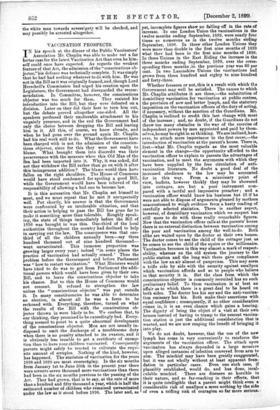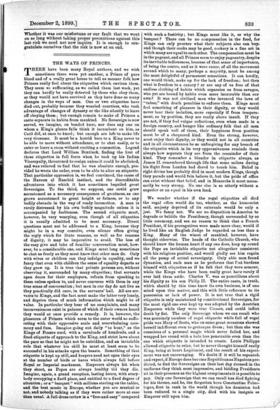VACCINATION PROSPECTS.
TN his speech at the dinner of the Public Vaccinators' Association Mr. Chaplin was able to make out a far better case for the latest Vaccination Act than even he him- self could once have expected. As regards the weakest feature of that Act, the admission of the "conscientious ob- jector," his defence was technically complete. It was simply that he bad had nothing whatever to do with him. He was not in the Bill as it was originally framed, and, though Lord Herschell's Commission had urged his creation upon the Legislature, the Government had disregarded the recom- mendation. In Committee, however, the conscientious objector was too much for them. They resisted his introduction into the Bill, but they were defeated on a division. Later on they did their best to turn him out, but the debate proved altogether one-sided. All the speakers professed their unalterable attachment to his ungainly presence, and in the end the Government had only the choice between dropping the Bill and leaving him in it. All this, of course, we knew already, and when he had gone over the ground again Mr. Chaplin had his real work still to do. What the Government have been charged with is not the admission of the conscien- tious objector, since for this they were not really to blame. What brought them into discredit was their perseverance with the measure when this Old Man of the Sea had been imported into it. Why, it was asked, did not they withdraw the Bill rather than go on with it after this incongruous addition ? The blame would then have fallen on the right shoulders. The House of Commons would have stood condemned for spoiling a good Bill, while the Government would have been relieved of the responsibility of allowing a bad one to become law.
It is this accusation that Mr. Chaplin set himself to meet, and we must repeat that •he met it unexpectedly well. Put shortly, his answer is that the Government were confronted by an intolerable situation, and that their action in helping to pass the Bill has gone far to make it something more than tolerable. Roughly speak- ing, the state of things immediately before the Bill of 1898 was brought in was this. One-third of the local authorities throughout the country had declined to help in carrying out the law. The consequence was that one- third of all the children annually born—say three hundred thousand out of nine hundred thousand— went unvaccinated. This immense proportion was growing larger every year ; indeed "in some places the practice of vaccination had actually ceased.' Thus the problem before the Government and before Parliament was "how to restart vaccination." What Ministers would have liked to do was to get from Parliament the addi- tional powers which would have been given by their own Bill, and to leave the conscientious objector to take his chance. But to this the House of Commons would not consent. It refused to strengthen the law unless the "conscientious objector" was put outside it. In many constituencies he was able to determine an election, in almost all he was a force to be reckoned with. Everything, therefore, turned on what the results of the Bill with the conscientious ob- jector thrown in were likely to be. We confess that, to our thinking, they promised to be exceedingly bad. Every- thing seemed to point to a quite abnormal development of the conscientious objector. Men are not usually in- disposed to omit the discharge of a troublesome duty when there is no penalty attached to its evasion, and it is obviously less trouble to get a certificate of exemp- tion than to have your children vaccinated. Consequently parents might safely be trusted to cultivate the requi- site amount of scruples. Nothing of the kind, however, has happened. The statistics of vaccination for the years 1898 and 1899 are most encouraging. In the six months from January let to June 30th in the present year there were seventy-seven thousand more vaccinations than there had been in the six months previous to the passing of the Act. They had grown, that is to say, at the rate of more than a hundred and fifty thousand a year, which is half the estimated number of children who remained unvaccinated tinder the law as it stood before 1898. The later and, as yet, incomplete figures show no falling off in the rate of increase. In one London Union the vaccinations in the twelve months ending September, 1899, were nearly four times as numerous as in the twelve months ending September, 1898. In three other London Unions they were more than double in the first nine months of 1899 what they had been in the first nine months of 1898. In three Unions in the East Riding the increase in the three months ending September, 1899, over the corre- sponding three months ,in the previous year was 60 per cent. In two Lancashire Unions the vaccinations had grown from three hundred and eighty to nine hundred and forty-three.
Whether foreseen or not, this is a result with which the Government may well be satisfied. The causes to which Mr. Chaplin attributes it are three,—the substitution of domiciliary vaccination for vaccination at public centres, the provision of new and better lymph, and the statutory imposition on the vaccination officers of the duty of acting, if necessary, without the sanction of the Guardians. Mr. Chaplin is inclined to credit this last change with most of the increase ; and, no doubt, if the Guardians do not throw too many obstacles in the way of the exercise of independent powers by men appointed and paid by them- selves, he may be right in so thinking. We are inclined, how- ever, to attach more importance to the first cause,—the introduction of vaccination at the parent's house. There is, first—what Mr. Chaplin regards as the most valuable element in the change—the opportunity afforded to the vaccination officer to explain to parents the advantages of vaccination, and to meet the arguments with which they have been supplied by the free circulation of anti- vaccination literature. No doubt a good deal of the increased obedience to the law may be accounted for in this way. From a missionary point of view, leaflets, however thickly they may be showered into cottages, are but a poor instrument com- pared with a tactful and impressive preacher ; and a vaccination officer would know his business but ill if be were not able to dispose of arguments gleaned by mothers unaccustomed to weigh evidence from a hasty reading of carefully selected statistics. There is another aspect, however, of domiciliary vaccination which we suspect has still more to do with these really remarkable figures. Now that the vaccination officer calls at the parents' house there is no external distinction between vaccination among the poor and vaccination among the well-to-do. Both alike are waited upon by the doctor at their own homes. The doctor comes to see the child of the cottager just as he comes to see the child of the squire or the millionaire. Vaccination becomes in this way almost a mark of respect- ability, whereas on the old system the journey to the public station and the long wait there gave compliance with the law an air almost of pauperism. This may seem a trifle side by side with the security against smallpox which vaccination affords and so to people who believe in that security it is. But the class from which the conscientious objector is commonly recruited has no such preliminary belief. To them vaccination is at best an affair as to which there is a great deal to be heard on both sides. The doctor has his say and the anti-vaccina- tion emissary has his. Both make their assertions with equal confidence; consequently, if no other consideration comes in, it is an even chance which gains a hearing. The dignity of being the object of a visit at their own houses instead of having to tramp to the nearest vaccina- tion station is just the additional consideration that is wanted, and we are now reaping the benefit of bringing it into play.
We do not doubt, however, that the use of the new lymph has come in very conveniently to reinforce the arguments of • the vaccination officer. The attack upon vaccination has always depended in a, large measure upon alleged instances of infection conveyed from arm to arm. The mischief may have been greatly exaggerated, but it was not wholly without at least apparent foun- dation in particular cases. Even one such case, if plausibly established, would do, and has done, incal- culable mischief. There are diseases so horrible in their nature, and so far-reaching in their effects, that it is quite intelligible that a parent might think even a considerable risk of smallpox a mere nothing by the side of even a trifling risk of contagion so far more serious. Whether it was our misfortune or our fault that we went on so long without taking proper precautions against this last risk we need not now inquire. It is enough to con- gratulate ourselves that the risk is now at an end.























































 Previous page
Previous page